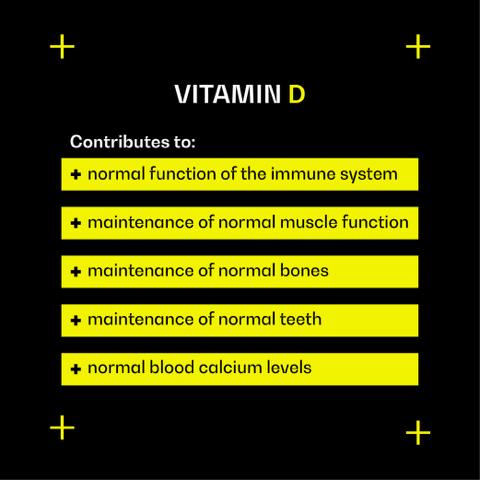VITAMIN D3 - ALL HAIL THE SUNSHINE VITAMIN
Until the coronavirus outbreak, Vitamin D didn’t grab the headlines it deserves. Yet this nutrient has a surprising number of benefits that are vital to survival. Originally discovered by the German researcher Adolf Windaus, vitamin D is produced naturally in our skin when exposed to sunlight. It has subsequently been dubbed ‘the sunshine vitamin’ by academics.
And for the science buffs among you, Vitamin D consists of D2-ergocalciferol and D3-cholecalciferol. Just in case you need to know for an exam, D1 is a compound rather than a pure vitamin so is no longer used and does not have a scientific name. Vitamin D is vitally important for maintaining healthy bones, teeth and muscles, but also has a string of other key benefits including facilitating a normal immune system.
SO, WHAT IS VITAMIN D?
Vitamin D is both a nutrient we eat and a hormone our bodies make. It is a fat-soluble vitamin that helps the body absorb and retain calcium and phosphorus which are critical to keep bones, teeth and muscles healthy. Vitamin D also has a vital role in the process of cell division and strengthening the immune system. Immunity is important for defending the body from foreign, viruses that cause illness and disease. Researchers have found a link between compromised immunity and a deficiency of vitamin D. It is therefore important to get a sufficient intake of D3…
SOURCES OF VITAMIN D
There are three ways that the body can get vitamin D:
1. from direct sunlight on the skin when outdoors
2. from a small number of foods including oily fish, red meat, liver, egg yolks and fortified foods (but it's difficult to get enough vitamin D from food alone)
3. from supplements
In the U.K., between October and early March we do not make enough vitamin D from sunlight and since it is difficult for people to get enough vitamin D from food alone, the NHS advise everyone should consider taking a daily supplement containing 10 micrograms (400 IU) of vitamin D during the autumn and winter.
Furthermore, the Department of Health and Social Care recommends that we take a daily supplement containing 10 micrograms of vitamin D every day throughout the year if we have dark skin (as the higher the levels of melanin, the less vitamin D the skin can absorb) OR are not often outdoors OR usually wear clothes that cover up most of our skin when outdoors.
VITAMIN D DEFICIENCY - AN IGNORED EPIDEMIC
Vitamin D deficiency appears to have crept up on the blindside. Researchers have discovered it’s a global pandemic that by and large has been ignored by health organisations and government bodies. In today’s society, there are several factors that contribute to low levels of D in the bloodstream, especially city dwellers. Such factors include:
+ Living in high pollution zones
+ Smothering yourself in high-block sunscreen
+ Spending too much time indoors with no exposure to natural sunlight
+ Living in large cities with high-rise buildings
+ Poor and/or vegan diet
SYMPTOMS OF VITAMIN D-FICIENCY
+ Tiredness, aches, pains and a general sense of not feeling well
+ Bone diseases such as osteomalacia and osteoporosis
+ Muscle pain
+ Weakness in legs when climbing stairs
+ Struggling to lift yourself out of a low chair
+ Stress factors in legs, pelvis and hips
Furthermore, researchers have found a link between vitamin D deficiency and depression, fatigue, chronic diseases, and male sexual function.
THE BENEFITS OF VITAMIN D3
SUPPORTS THE IMMUNE SYSTEM:
Studies show that people who do not have adequate vitamin D levels might be at increased risk of infections and autoimmune diseases. For example, a review of 25 studies involving more than 11,000 participants found that vitamin D supplementation helped reduce the risk of respiratory tract infections (such as the common cold, bronchitis, and pneumonia). Supplementation was even more beneficial for people with low or very low levels of vitamin D.
REDUCES THE RISK OF DISEASE:
Studies show that vitamin D may play a role in improving our resistance to certain diseases. For example:
+ A large study found that high circulating levels of vitamin D are associated with a lower risk of multiple sclerosis.
+ A meta-analysis including 81 randomized clinical trials, highlighted the ability of vitamin D supplementation to improve some cardiovascular risk factors including elevated blood pressure, hyperparathyroidism, dyslipidemia, and inflammation.
+ A review found that several studies have demonstrated a strong association between vitamin D insufficiency and risk of cardiovascular disease, risk of diabetes and metabolic syndrome.
+ A review found that vitamin D supplements may help treat hypertension and high blood pressure.
+ A study found that vitamin D supplementation during the winter may reduce the incidence of influenza
+ A large study found a beneficial role for vitamin D intake in reducing the risk of type 2 diabetes.
+ Studies have found that higher vitamin D levels have been consistently associated with reduced risks of certain cancers.
+ A systematic review and meta-analysis of randomized, controlled trials, found that supplementing with vitamin D may protect against negative outcomes related to COVID-19.
REGULATES MOOD & REDUCES DEPRESSION:
Research has shown that vitamin D might play an important role in regulating mood and fighting off depression. For example:
+ A review of 25 trials involving more than 7,500 people found that those experiencing negative emotions who received vitamin D supplements noticed an improvement in symptoms. The meta-analysis concluded that patients with major depressive disorder and individuals with vitamin D deficiency are most likely to benefit from supplementation.
+ A study identified low vitamin D levels as a risk factor for more severe fibromyalgia symptoms, anxiety, and depression.
MAINTAINS MUSCLE FUNCTION:
Vitamin D contributes to the maintenance of normal muscle function. Studies have demonstrated that vitamin D supplementation can improve muscle strength which in turn contributes to a decrease in incidence of falls, one of the largest contributors to fracture incidence. For example, a study, involving more than 4000 older adults (>or=60) reported vitamin D plasma concentrations in the range of 40-90nmol/L was associated with improved musculoskeletal function versus serum concentrations <40nmol/L.
HELPS WITH WEIGHT LOSS:
A study in the British Journal of Nutrition showed that people taking a daily calcium and vitamin D supplement were able to lose more weight than subjects taking a placebo.
BOOSTS ENERGY LEVELS:
Vitamin D plays a role in reducing fatigue and boosting energy levels because it aids the function of the mitochondria within the body’s cells, which is responsible for creating energy. Research has shown that Vitamin D deficiency is associated with fatigue. For example, a study found that patients with vitamin D deficiency who experienced symptoms of muscle fatigue, improved their muscle efficiency and recovery rates when their vitamin D levels were improved. Furthermore, all patients reported an improvement in symptoms of fatigue after having taken the supplements.
SUPPORTS SEXUAL FUNCTION:
Although research into the effects of vitamin D on sexual performance is limited, some studies have found a link between vitamin D deficiency and male sexual function. For example:
+ A study involving 260 men clearly demonstrates a direct and positive relationship between vitamin D levels and overall semen quality, male reproductive potential and testosterone levels.
+ A meta-analysis of 8 studies involving 4055 patients found that vitamin D deficiency may be associated with severe forms of erectile dysfunction.
+ A small study investigating sexual function and depression symptoms in young men, found that men with vitamin D deficiency or insufficiency had lower levels of erectile function than men with normal vitamin D levels.
KEEPS TEETH & GUMS HEALTHY:
Vitamin D plays a key role in absorbing and retaining calcium and phosphorous for tooth mineralization. When our vitamin D levels are unregulated, it weakens our teeth, making us highly susceptible to cavities, fractures, and decay. Researchers have linked a vitamin D deficiency to two main oral issues: Tooth Decay and Periodontitis (gum disease). For example, a comprehensive review of studies found vitamin D deficiency is highly implicated with oral diseases and has been linked with a higher risk of tooth defects, caries, periodontitis and oral treatments failure.
And of course Vitamin D is essential for maintaining strong bones....
DEM BONES, DEM VITAMIN D BONES
Vitamin D helps the body absorb and use calcium and phosphorus, which keeps bones (and teeth) strong.
Calcium assists the heart, blood and enables your muscles to contract so you can lift things - including yourself. Without vitamin D your bones become brittle and break easily, and your legs are prone to buckle. Around 99% of the calcium in your body is needed for the bones and teeth but we lose a little every day through skin, nails, hair, sweat, urine and faeces. Your body does not produce calcium naturally. It requires a source of vitamin D such as sunlight, certain foods and/or supplements.
It is well established that low vitamin D levels can lead to bone weakness and increase your risk of osteoporosis and broken bones. And a severe shortage of vitamin D causes rickets and osteomalacia (soft bones). For example:
+ A review showed that inadequate vitamin D intakes over long periods of time can lead to decreased calcium absorption, bone demineralization, weakened bones, increased risk of fractures and ultimately the development of osteopenia and osteoporosis.
+ A controlled trial of 100,000 IU oral Vitamin D supplementation, involving more than 2,500 adults, reported a 33% lower rate for fracture and a 22% lower rate for first fracture at any site compared to a placebo.
+ A meta-analysis of seven randomised controlled trials involving older persons (>or=60) concluded vitamin D supplementation in the range of 700-800 IU/d reduced the risk of hip/non-vertebral fractures by 25%.
+ A study reported a significant benefit in bone mineral density after only five weeks in participants with impaired vitamin D status and osteoporosis/ osteopenia.
PARTING SHOT
The World Health Organisation has dubbed the UK ‘the third fattest nation in Europe’. That smarts a bit, to be honest. Guys we need to shape up and level up our health game. As outlined above, researchers have found vitamin D has an appetite-suppressing quality that can be used to control weight. What’s more, obesity increases the risk of death to Covid-19 by around 48%. Vitamin D, on the other hand, helps to improve the immune system to help fight coronavirus (and other viruses) - so two birds one stone. If health and wellbeing wasn’t already a topic that required urgent discussion among men, the coronavirus pandemic should have set your alarms ringing.
HIMMENSE supplements contain Vitamin D. So we've got you covered.
Advice is for information only and should not replace medical care. Consult a healthcare professional if you have any questions or are taking any other medications before you try any remedies or supplements.
Read more Men's Health & Lifestyle blogs from HIMMENSE here




